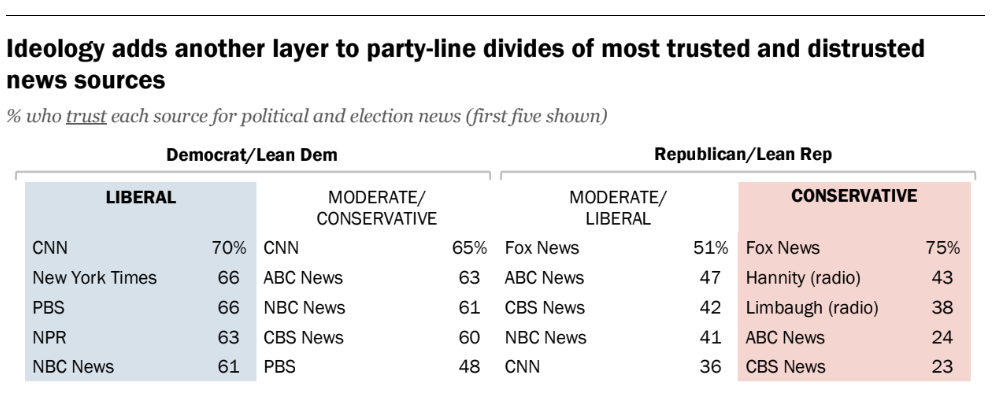Pew: Political Divide is Also News Trust Divide
The smarter way to stay on top of the multichannel video marketplace. Sign up below.
You are now subscribed
Your newsletter sign-up was successful
It will come as a surprise to few, but media polarization has increased in the past half decade and, a new Pew Research report asserts, appears to have been driven by Republican's increasing distrust of the media. Pew will track that divide as the nation ultimately comes together at the polls to pick then next President and slate of elected officials nationwide.
Of the 30 news sources* cited in the survey, "U.S. Media Polarization and the 2020 Election: A Nation Divided," none were trusted by more than half of the respondents.

That is according to a survey of 12,043 U.S. adults, all members of Pew's American Trends online panel, conducted in October and November of 2019. They were asked which news outlets they relied on and trusted for news about politics and the upcoming 2020 election.
Certainly the current head of the Republican party, President Donald Trump, has done his part in fomenting that distrust, regularly branding the mainstream media as political enemies and fake news.
Republicans said they distrusted 20 of the 30 sources cited, with only seven of those news sources them generating more trust than distrust led by Fox News, with 65% saying they trust that outlet. That outlet "towers above all others" among Republicans as a go-to source for political news, Pew said.
CNN was the most trusted by Democrats, with 67% saying that was the case.
A big difference is that while no other news sources comes close to rivaling Fox among Republicans, a number of sources besides CNN are highly trusted and frequently used by Democrats. For example, two thirds of liberal Democrats trust the New York Times, while just 10% of conservative Republicans do.
The smarter way to stay on top of the multichannel video marketplace. Sign up below.
Between the 2014 study and this latest one, Republicans’ distrust increased for 14 of the 20 sources that were the same in both years, including distrust of CNN, The Washington Post, and The New York Times (all particular targets of the President's animus).
The survey found that Republicans and Republican-leaning independents view many mainstream media outlets as untrustworthy, the same outlets Democrats and leaners mostly see as credible.
Compared to a similar study in 2014, Republicans are even more alienated from most of the "more established" sources, while Democrats remain confident in them, an in some cases even more confident than before.
One big takeaway is that just because people use a news source does not mean they necessarily trust it. While 24% of Republicans said they got news from CNN "in the past week," some four-in-ten who did said they distrusted CNN. Similarly, of the 23% of Democrats who got political news from Fox nearly three-in-ten (27%) said they distrusted it.
The survey also marks the launch of a Pew Research Center Election News Pathways initiative that will extend through the 2020 election and explore how American's news habits and attitudes affect their perception of that election.
There will be five more surveys conducted as part of the initiative, all drawn from Pew's American Trends Panel.
Pew will make that raw data available online for independent analysis via an online tool, API and data set, updated approximately every other month. It will also issue weekly (Wednesdays at 10 a.m.) email alerts with analysis that news outlets can use in their reporting on the election. Pew will also hold workshops for journalists interested in learning more about the initiative.
* The 30 outlets polled were: ABC News, BBC, Breitbart, Business Insider, BuzzFeed, CBS News, CNN, Daily Caller, Fox News, HuffPost, MSNBC, NBC News, Newsweek, New York Post, NPR, PBS, Politico, Rush Limbaugh Show (radio), Sean Hannity Show (radio), The Guardian, The Hill, New York Times, Wall Street Journal, Washington Post, Time, Univision, USA Today, Vice, Vox, Washington Examiner.
Contributing editor John Eggerton has been an editor and/or writer on media regulation, legislation and policy for over four decades, including covering the FCC, FTC, Congress, the major media trade associations, and the federal courts. In addition to Multichannel News and Broadcasting + Cable, his work has appeared in Radio World, TV Technology, TV Fax, This Week in Consumer Electronics, Variety and the Encyclopedia Britannica.

